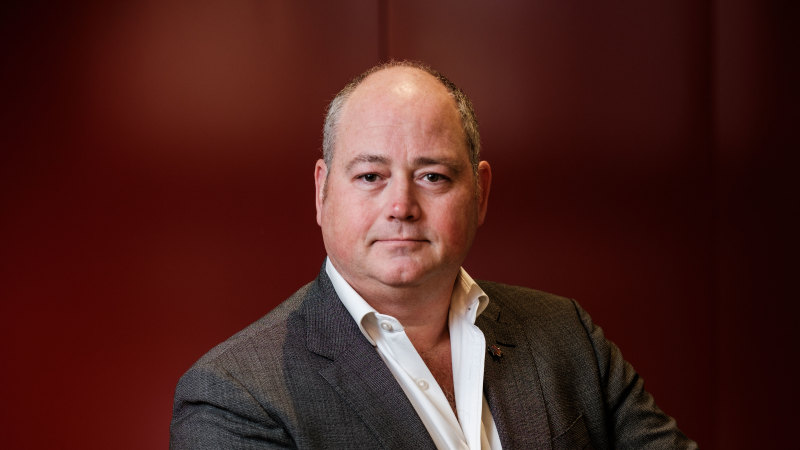Reduce carbon footprint if you want cheap finance: NAB
Save articles for later
Add articles to your saved list and come back to them any time.
Australia’s largest business lender has said it is inevitable banks will charge higher interest rates for businesses that do not have credible plans to reduce their emissions footprint.
NAB’s group executive for business and private banking, Andrew Irvine, told a Trans-Tasman Business Circle event on Thursday that small and medium-sized companies would need to begin measuring and then reducing their carbon footprint if they wanted cheaper finance.
NAB’s Andrew Irvine says the risks of climate change can threaten the long-term viability of a business and expose banks to greater risk.Credit: Oscar Colman
“Today I ask for your income and expense, tomorrow I will be asking for your income, expenses and carbon footprint – it’s a virtual certainty that will happen,” Irvine said.
“If your abatement is less than average, your interest rate will be higher than if your abatement is higher than average. Our risk as a bank will be impacted by how green your business is. It’s not to say we won’t bank you, but the cost of borrowing will be affected.”
Irvine said the bank was piloting a tool with 100 of its business customers to help them determine their carbon footprint and use evidence to reduce it.
His comments were in line with the views of his counterpart at Westpac, Anthony Miller, who last year predicted that by 2027 big corporations would not be able to secure a loan from a bank unless they provided a credible plan to cut their carbon emissions.
Rabobank’s global head of rural and food, Lara Yocarini, told reporters in New Zealand on Thursday that banks would eventually start to impose higher interest rates on farmers and rural businesses that weren’t achieving satisfactory greenhouse gas reductions.
“If a client has a sustainability-linked loan with us and they actually meet those targets, they do indeed get a discount on their lending rate,” Yocarini said.
Agriculture is among the largest sources of greenhouse gases causing global warming, with nitrogen from fertiliser and methane from livestock coming under scrutiny from climate activists. In New Zealand, nearly half of all emissions come from farming.
Australian Conservation Foundation corporate campaigner Jonathan Moylan welcomed Irvine’s comments and said the community was already paying a “carbon price” in the form of extreme heat, bushfires, drought and floods.
“It was always inevitable that financial institutions would start to impose carbon pricing given the enormous risks that climate change poses to our economy,” Moylan said. “But we’d like the banks to do far more by reining in companies that are still building big new oil and gas projects.”
There is increasing scrutiny of the impact lending has on reducing climate emissions and banks are under pressure to be at the forefront of decarbonising.
Irvine conceded that the risks of climate change would threaten the long-term viability of a business and expose banks to greater risk, including through increased insurance premiums or the possibility of a business losing their property in a bushfire or flood.
Environment Victoria’s senior climate and energy adviser, Kat Lucas-Healey, said reducing emissions should be everybody’s business.
“The insurance industry has been quick to recognise and account for climate and extreme weather risks and the Australian Competition and Consumer Commission have been cracking down on greenwashing claims by businesses,” Lucas-Healey said.
“The key point is credibility. If businesses are making claims that won’t ever lead to meaningful emissions reduction, of course they’re a higher risk for lenders.”
With Bloomberg
The Business Briefing newsletter delivers major stories, exclusive coverage and expert opinion. Sign up to get it every weekday morning.
Most Viewed in Business
From our partners
Source: Read Full Article


